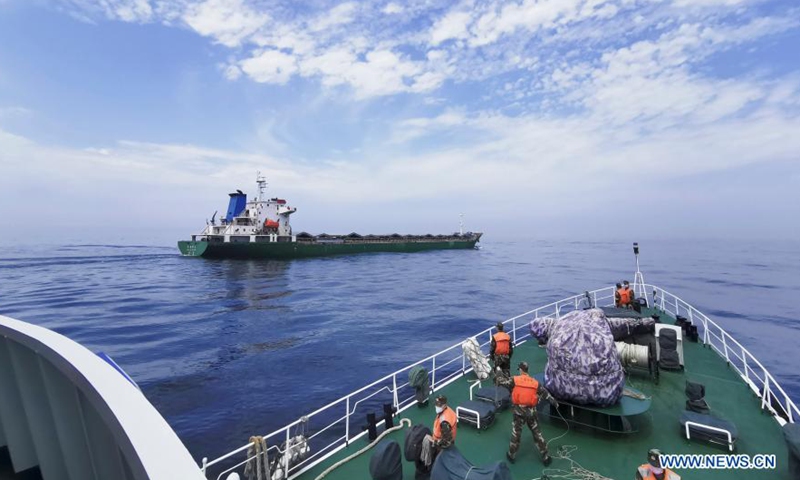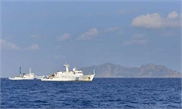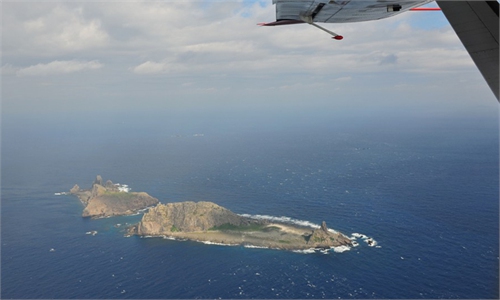China's Coast Guard Law unlocks new chapter of maritime legal enforcement cooperation

Photo taken with mobile phone on March 26, 2020 shows a vessel of the coast guard intercepting a vessel suspected of smuggling at sea.File photo:Xinhua
With the development of the global maritime sector and relevant governance, the concept of "maritime community with shared future" has won increasing support worldwide. Building a secure and stable marine environment has become a common aspiration of the international community.
Strengthening the international cooperation in maritime law enforcement and jointly coping with maritime challenges and crises is a realistic and effective way to promote global maritime governance to benefit all countries involved. For a long time, China's coast guards have actively participated in regional and international cooperation in maritime law enforcement. They have earnestly implemented international treaties and UN Security Council's resolutions, played a significant role in providing humanitarian assistance and aid at sea, contributed to the protection of marine ecological environment and maintaining maritime security and stability. On February 1, China's Coast Guard Law was enacted, which provides a more solid basis for the international cooperation and kick starts a new chapter of our country's maritime law enforcement cooperation.
The China Coast Guard (CCG), China's major maritime law enforcement agency, has signed multiple bilateral memorandums of understanding, cooperation agreements with maritime law enforcement agencies of our maritime neighboring countries, and has carried out practical collaboration with not only our neighbors, but also the US, Russia, France, Germany, etc. Through the mutual visits between coast guard vessels and personnel training, the CCG has expanded its partnership with major maritime countries in the region and in the world, which is vital for building regional and global maritime law enforcement cooperation networks.
The CCG also proactively participates in the North Pacific Coast Guard Forum, the Asian Coast Guard Agencies Senior Officer Meeting, the Regional Cooperation Agreement on Combating Piracy and Armed Robbery Against Ship in Asia and other institutional multilateral meetings. It has earnestly implemented the "Convention on the Conservation and Management of High Seas Fisheries Resources in the North Pacific Ocean" and other international treaties, jointly coped with other non-traditional security threats with other countries. CCG has increasingly become an important force for maintaining maritime security and promoting regional peace and stability.
The promulgation and implementation of China's Coast Guard Law is conducive to clarifying coast guards' duties and limits of authority. It defines the basic scope of the mission of maritime law enforcement, distinguishes CCG's functions with those of other maritime authorities, coordinates issues related to maritime law enforcement cooperation and guides coast guards to carry out law enforcement activities within the legal framework. China's Coast Guard Law stipulates the basis, objects and main tasks of the foreign cooperation of China's coast guard agencies. It also regulates the limits of authority and measures for coast guards when carrying out maritime law enforcement cooperation. It is an important part of comprehensively promoting China's law-based governance in the field of maritime law enforcement.
In recent years, China's foreign-related law enforcement tasks have been increasing, and the challenges they are faced with have become increasingly complex. Therefore, the ability and level of maritime law enforcement cooperation needs to be further enhanced. At the same time, with the further development of China's reform and opening up and economic globalization, China's overseas interests are constantly expanding. The Chinese government has the obligation and right to take necessary measures in accordance with international law to protect our country's overseas interests.
China's Coast Guard Law is conducive to standardizing China's maritime law enforcement cooperation. It covers issues in various fields such as maritime crime fighting, exploitation and utilization of marine resources, marine ecological environment protection and marine fishery management. It has improved maritime administrative law enforcement, standardized relevant law enforcement details, made up for the previous vacancy in China's maritime criminal legislation and further regulated China's maritime law enforcement activities. All these provide a more stable guarantee for the cooperation between China's coast guards and their foreign counterparts.
China's Coast Guard Law helps promote China's international cooperation in maritime law enforcement to a higher level. It uses international treaties as the basis for law enforcement cooperation and fixes CCG's international obligations in the form of a domestic law. The law clarifies the scope of international cooperation in law enforcement, advocates the establishment of an institutional law enforcement cooperation mode, emphasizes the joint maintenance of maritime public security order with other countries and reflects China's view of maritime governance based on "consultation, contribution and shared benefits'' China's Coast Guard Law also gives CCG freedom and flexibility in terms of cooperation and reserves space for better law enforcement cooperation with other countries and participation in global maritime governance.
It is foreseeable that, under the guidance and regulation of China's Coast Guard Law, CCG will further expand the breadth and depth of maritime law enforcement cooperation in the future, set a new pattern of international cooperation in maritime law enforcement and start a new chapter of international cooperation in maritime law enforcement.
The author is an observer of international affairs. opinion@globaltimes.com.cn


